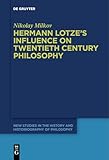Hermann Lotze's Influence on Twentieth Century Philosophy / Nikolay Milkov.
Material type: TextSeries: New Studies in the History and Historiography of Philosophy ; 12Publisher: Berlin ; Boston : De Gruyter, [2023]Copyright date: ©2023Description: 1 online resource (XIV, 205 p.)Content type:
TextSeries: New Studies in the History and Historiography of Philosophy ; 12Publisher: Berlin ; Boston : De Gruyter, [2023]Copyright date: ©2023Description: 1 online resource (XIV, 205 p.)Content type: - 9783110726817
- 9783110726381
- 9783110726282
- 193
- online - DeGruyter
- Issued also in print.
| Item type | Current library | Call number | URL | Status | Notes | Barcode | |
|---|---|---|---|---|---|---|---|
 eBook
eBook
|
Biblioteca "Angelicum" Pont. Univ. S.Tommaso d'Aquino Nuvola online | online - DeGruyter (Browse shelf(Opens below)) | Online access | Not for loan (Accesso limitato) | Accesso per gli utenti autorizzati / Access for authorized users | (dgr)9783110726282 |
Frontmatter -- Contents -- Preface -- Acknowledgements -- Introduction: Why Lotze? -- Part I: Lotze’s Philosophy -- Chapter 1 Lotze’s Philosophy: An Outline -- Chapter 2 Lotze’s Philosophy of Psychology -- Chapter 3 Lotze’s Philosophical Anthropology -- Part II: Lotze and the Descriptive Psychology -- Chapter 4 Lotze and Franz Brentano -- Chapter 5 Lotze and Carl Stumpf -- Part III: Lotze and Bertrand Russell -- Chapter 6 Lotze and Bertrand Russell -- Chapter 7 Bertrand Russell’s Notes on McTaggart’s Lectures on Lotze -- Chapter 8 Lotze, William James, and Bertrand Russell -- Part IV: Lotze and the Philosophy of Logical Empiricism -- Chapter 9 Lotze, Heinrich Rickert, and Logical Empiricism -- References -- Index
restricted access online access with authorization star
http://purl.org/coar/access_right/c_16ec
Hermann Lotze was a key figure in the philosophy of the second half of the 19th century, influencing practically all leading philosophical schools of the late 19th and the early 20th century: (i) the neo-Kantians; (ii) Brentano and his school of descriptive psychology; (iii) the British idealists; (iv) Husserl’s phenomenology; (v) Dilthey’s philosophy of life; (vi) Frege’s new logic; (vii) the early Cambridge analytic philosophy; (viii) William James’s pragmatism. The book first presents the main ideas of Hermann Lotze’s philosophy (Part I), and then traces his influence on the descriptive psychology of Franz Brentano and Carl Stumpf (Part 2) and Cambridge analytic philosophy (Part 3). In addition, the book includes Bertrand Russell’s conspectus of J. E. McTaggart’s 1898 lectures on Lotze.
Issued also in print.
Mode of access: Internet via World Wide Web.
In English.
Description based on online resource; title from PDF title page (publisher's Web site, viewed 06. Mrz 2024)


